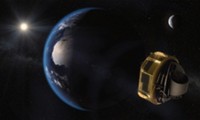Advertisement
Grab your lab coat. Let's get started
Welcome!
Welcome!
Create an account below to get 6 C&EN articles per month, receive newsletters and more - all free.
It seems this is your first time logging in online. Please enter the following information to continue.
As an ACS member you automatically get access to this site. All we need is few more details to create your reading experience.
Not you? Sign in with a different account.
Not you? Sign in with a different account.
ERROR 1
ERROR 1
ERROR 2
ERROR 2
ERROR 2
ERROR 2
ERROR 2
Password and Confirm password must match.
If you have an ACS member number, please enter it here so we can link this account to your membership. (optional)
ERROR 2
ACS values your privacy. By submitting your information, you are gaining access to C&EN and subscribing to our weekly newsletter. We use the information you provide to make your reading experience better, and we will never sell your data to third party members.
Astrochemistry
Hunt for habitable exoplanets needs new telescopes, report says
by Sam Lemonick
September 15, 2018
| A version of this story appeared in
Volume 96, Issue 37

To find out how rare our solar system is, a report from the U.S. National Academies of Sciences, Engineering & Medicine recommends NASA fund new space telescopes to directly observe planets orbiting distant stars and to identify the chemicals in those planets’ atmospheres. Astronomers know of more than 3,800 planets beyond our solar system, most discovered in the past decade, and NASA’s James Webb Space Telescope is expected to extend that search when it launches in the next several years. Nevertheless, the congressionally mandated report describes a “substantially incomplete” understanding of what kinds of exoplanets exist and how many there are of each type. The report’s suggested solution is a space-based, near-infrared telescope. As a first step, the report endorses NASA’s planned Wide Field Infrared Survey Telescope (WFIRST), which could demonstrate coronagraphic technology to block the brightest light from a star so orbiting planets become visible. A more powerful version could identify methane and other chemicals in an exoplanet’s atmosphere. And new ground-based telescopes planned and under construction can provide complementary chemical data about exoplanet atmospheres.





Join the conversation
Contact the reporter
Submit a Letter to the Editor for publication
Engage with us on Twitter